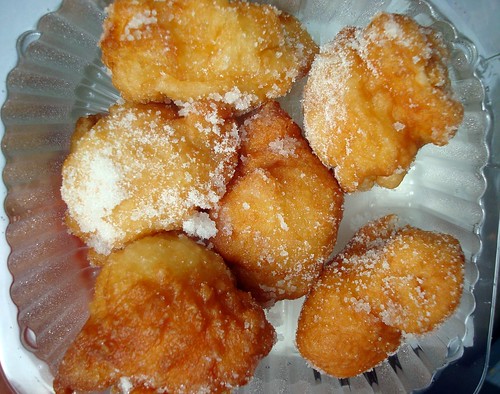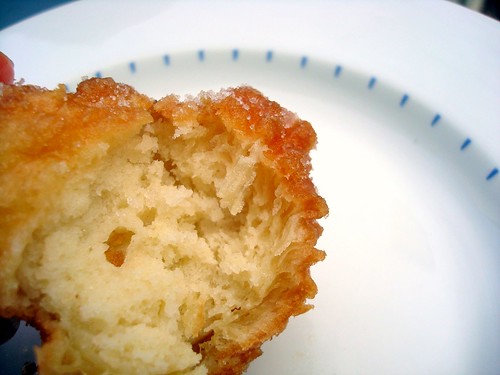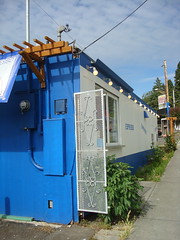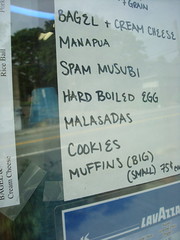
Recently, a new espresso stand opened up very close to the CakeSpy headquarters in Seattle, a little outpost of North Shore Hawaiian BBQ. Now, this is one of those places that looks like it might be awful or awesome, but probably not in-between.
While waiting for the malasadas to fry up, however, I noticed something unusual: they were listed on the menu as Portuguese Doughnuts. Now, this seemed a big incongruous on a Hawaiian menu. Naturally, I ran home to Wikipedia the *&^% out of this.
As Wikipedia tells me, it was a development borne of immigration patterns: "In 1878, Portuguese laborers from the Azores came to Hawaii to work in the plantations. These immigrants brought their traditional foods with them, including a fried dough pastry called the 'malasada.' Today there are numerous bakeries in the Hawaiian islands specializing in malasadas."
The article references one of the most famous malasada vendors in Hawaii, Leonard's Bakery, which may not have been the first place to sell them, but it certainly sounds like it's the place that made them popular; their story further illuminates the phenomenon of the Portuguese doughnut in Hawaii:
In June 1882 the British sailing ship 'Monarch' brought Arecnion & Amelia DoRego from San Miguel Island, Portugal to Maui under contract to work the sugar cane fields.
Some 33 years later, their grandson Leonard was born. In 1946 Leonard and his wife Margaret moved to Honolulu with their daughter Diane, age 8. Leonard worked at Snowflake Bakery until he founded Leonard's Bakery in 1952
Leonard and Margaret were no strangers to hard work, both coming from very large families. The bakery prospered. Not long after opening, Leonard's mother suggested making malasadas for Shrove Tuesday - a Portuguese tradition.
Although thinking it may be too ethnic, Leonard's bakers complied. Malasadas were a huge hit. And, the appetite for malasadas in Hawaii was born.
Due to Leonard's popularity Leonard required a larger, more modern facility, moving into their present location at 933 Kapahulu Avenue in 1957.
These days, malasadas are closely associated with Hawaii. They're seen dressed up at fancy restaurants, they're sold out of mobile trucks, and they're naturally a delicious breakfast.
(CakeSpy Note: Strangely enough, according to Wikipedia, Hawaii is not the only place where malasadas are readily available: "Malasadas are also very popular in the New Bedford and Fall River, Massachusetts region, which has a large Portuguese population. Malasadas are also popular in Cape Cod, Massachusetts, where they are called 'flippers'." So perhaps there is a hidden malasada belt in New England?)
Which brings us back to Seattle and North Shore Hawaiian BBQ. Remember how I said that this place was going to be either awesome or awful? Well, I can't speak to the savory fare there, but these malasadas were pretty awesome. They charmingly misshapen rounds, served unpretentiously in a plastic container and they were still hot and slightly dripping with the oil in which they had just been fried. The first irresistible bite, taken while they were still way too hot, was yeasty, sweet, pleasingly greasy, and, well, pretty perfect.


